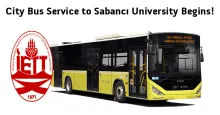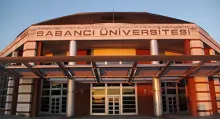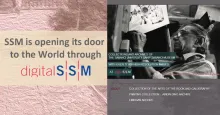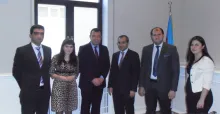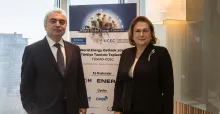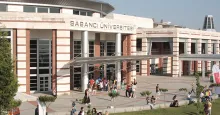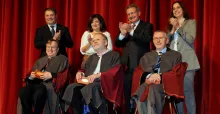TÜSIAD and Sabancı University Center For Energy And Climate (IICEC) Present “World Energy Outlook 2013” Turkey Report
Sabancı University Board of Trustees Chair Güler Sabancı: “Market liberalization must continue in the energy sector”
“IICEC Is a north star rising from Istanbul”
“We must aim to achieve a more competitive energy market”

A meeting was held for the presentation of the “World Energy Outlook 2013” Turkey Report prepared by Sabancı University Center for Energy and Climate (IICEC) and TÜSİAD. The report was presented by International Energy Agency Chief Economist Dr. Fatih Birol.
Sabancı University Board of Trustees Chair Güler Sabancı, TÜSİAD Vice President Memduh Boydak and Deputy Minister of Energy and Natural Resources Hasan Murat Mercan made introductory remarks.
Speaking first, Sabancı University Board of Trustees Chair Güler Sabancı said, “As the demand for energy increases, great investments in all segments of the energy sector are needed on an annual basis. We need 8 to 10 billion dollars in investments every year in order to meet the demand for electricity in a secure and sustainable way. There are two prerequisites to attracting investments on this scale: a stable economy, and a liberal, transparent and competitive energy market. Important steps have been taken lately to encourage competition in the electricity sector and expedite investments. We have had tangible results in the development of a liberal electricity market, where our group company EnerjiSA is one of the leading private actors in electricity production, trade and sale.
“The New Electricity Market Law adopted this year was another leap forward in liberalization. The privatization of distribution was completed this year. With the reduction in free consumer thresholds, theoretical market openness at the end-consumption level exceeded 80%. In a few years, when the free consumer threshold is eliminated, the fully-competitive retail market will have been achieved. However we must not settle for these; we must aim to achieve a more competitive energy market that will give more support to the growth and competitiveness of the Turkish economy, and offer more benefits to the consumer.”
Next, TÜSİAD Vice President Memduh Boydak said that the energy sector had been growing and transforming in the last few years. Boydak noted that the energy demand in some countries boomed alongside economic development, adding “As a result, the demand for energy is shifting from the West to the East. Meanwhile, developments such as the economically-viable extraction of shale gas are worth noting, as are the changes in priorities brought by environmental concerns, not the least of which is climate change. These all result in a significant disruption in the energy market equilibrium.”
Explaining that the industry was central to growth and competitive strength, Boydak referred to the observation in the competition report issued by the European Union in 2013 that growth and employment would not be possible without industry.
Boydak mentioned the energy sources in the Eastern Mediterranean, the nuclear power agreement with Iran, and the developments in the supply of Iraqi oil and gas as critical agenda items. Mernduh Boydak said that the Natural Gas Market Law would complete the recent regulatory acts in the electricity market and the energy exchange, concluding: “Considering that an amendment to the law is currently being worked on, I must note that cost-based pricing, the restructuring of BOTAŞ, and the issue of contract assignment are critical to the liberalization of the sector.”
The “World Energy Outlook 2013” Turkey Report was then presented by International Energy Agency Chief Economist Dr. Fatih Birol.
Issued by the International Energy Agency (IEA), the “World Energy Outlook” Report contains the latest forecasts for the next 20 years, policy developments and recent analyses supported by the learnings of the past year. “World Energy Outlook” includes the latest supply and demand projections according to a variety of scenarios, countries, industries and fuel types. The report includes important assessments on how the energy system might be transformed in the short and medium term, and is a reference book for anyone wishing to stay abreast of the energy industry.
The event included a panel discussion on “Shifts in the Global Energy Balance and Competition” moderated by Selahattin HAKMAN, President of the TÜSİAD Working Group on Energy and Group President of Energy of the Sabancı Group.
Speakers of the panel were Deputy President of TÜSİAD Working Group on Energy, Nusret CÖMERT; Vice-President of TÜSİAD Working Group on Energy, Batu AKSOY; President of TÜSİAD Working Group on Environment, Ahmet DÖRDÜNCÜ; Genel Enerji CEO Tony HAYWARD and Paris Institute for Political Science Studies (Science Po) International Energy Division Director Giacomo LUCIANI on their thoughts about energy markets.


